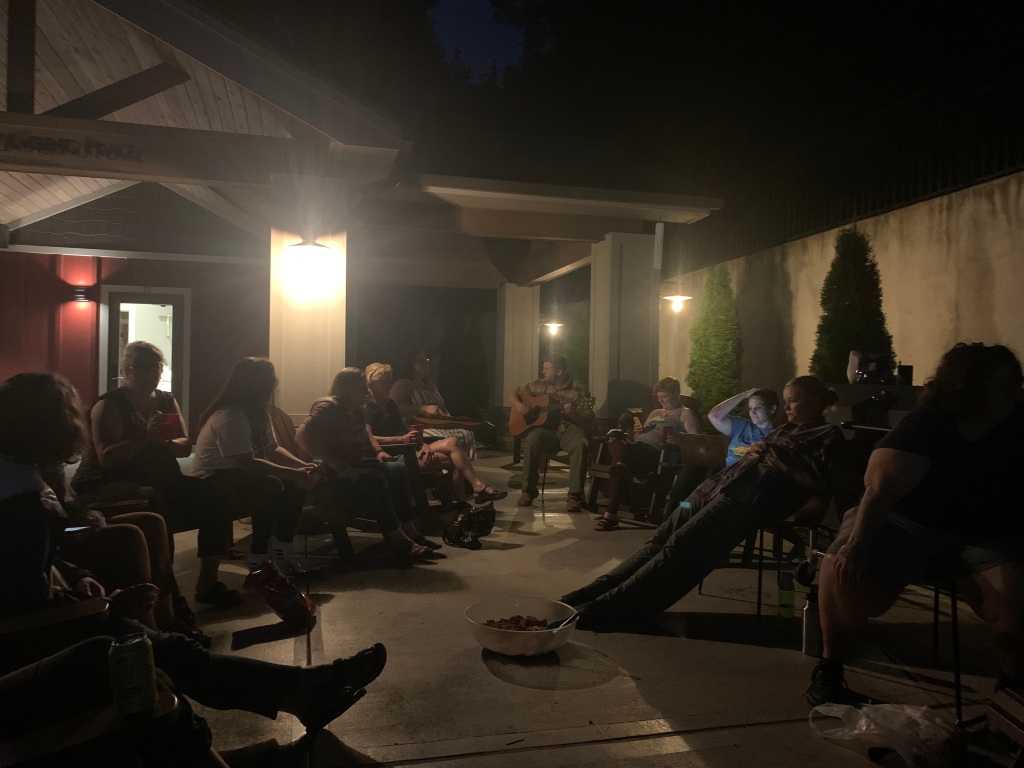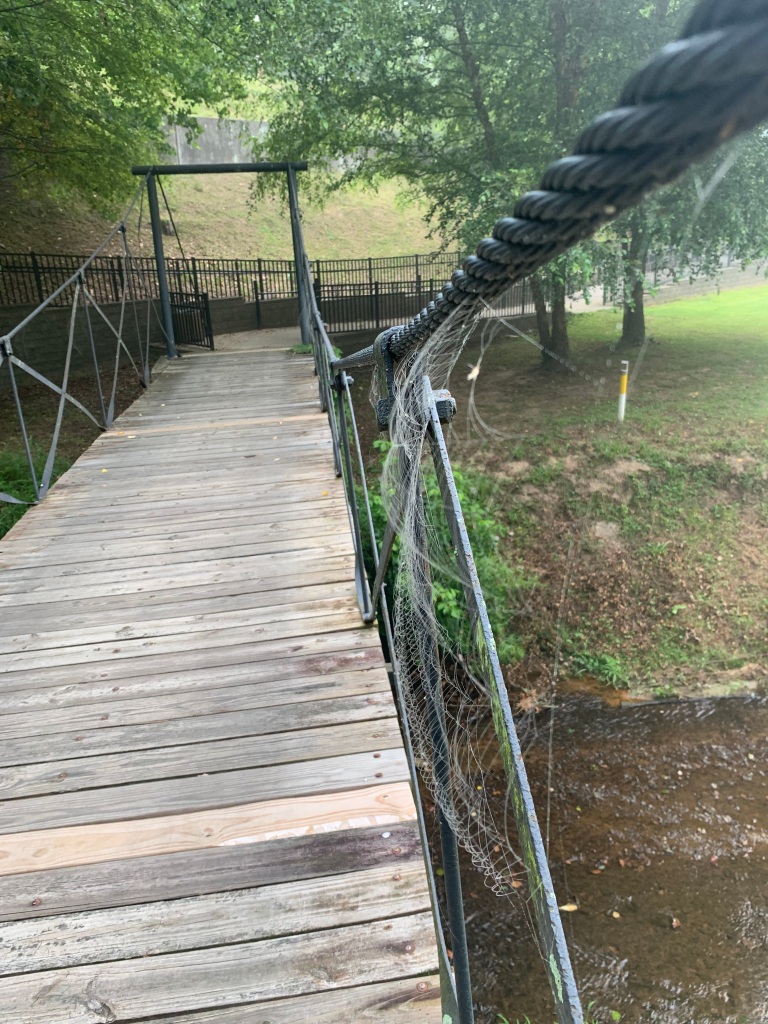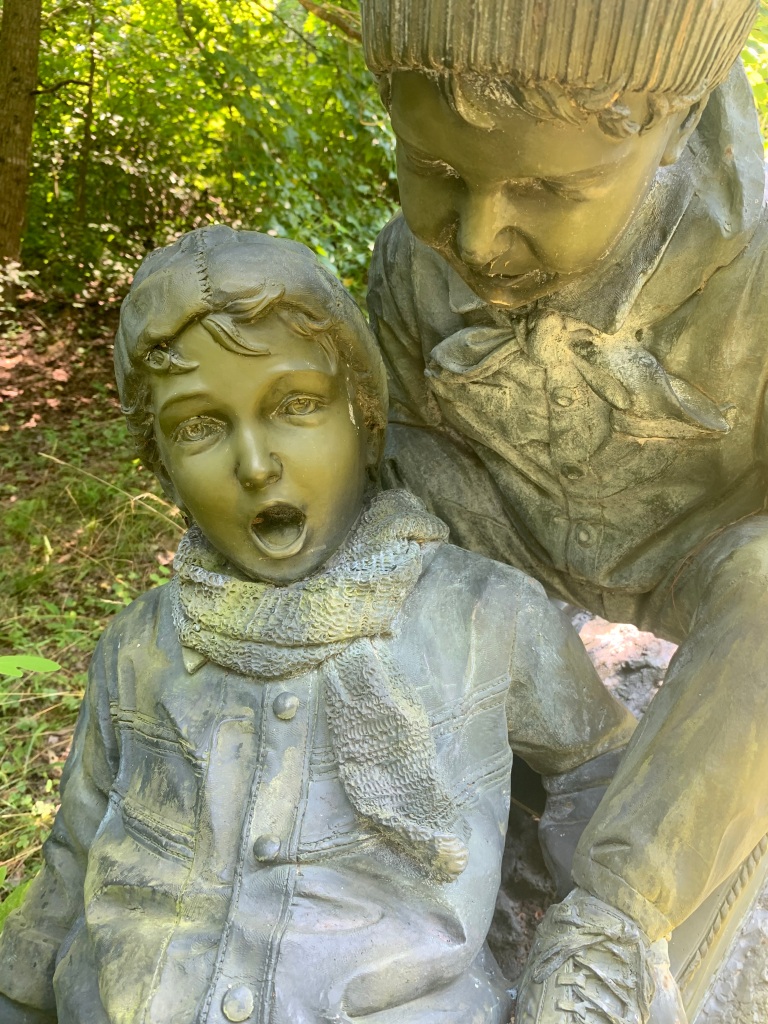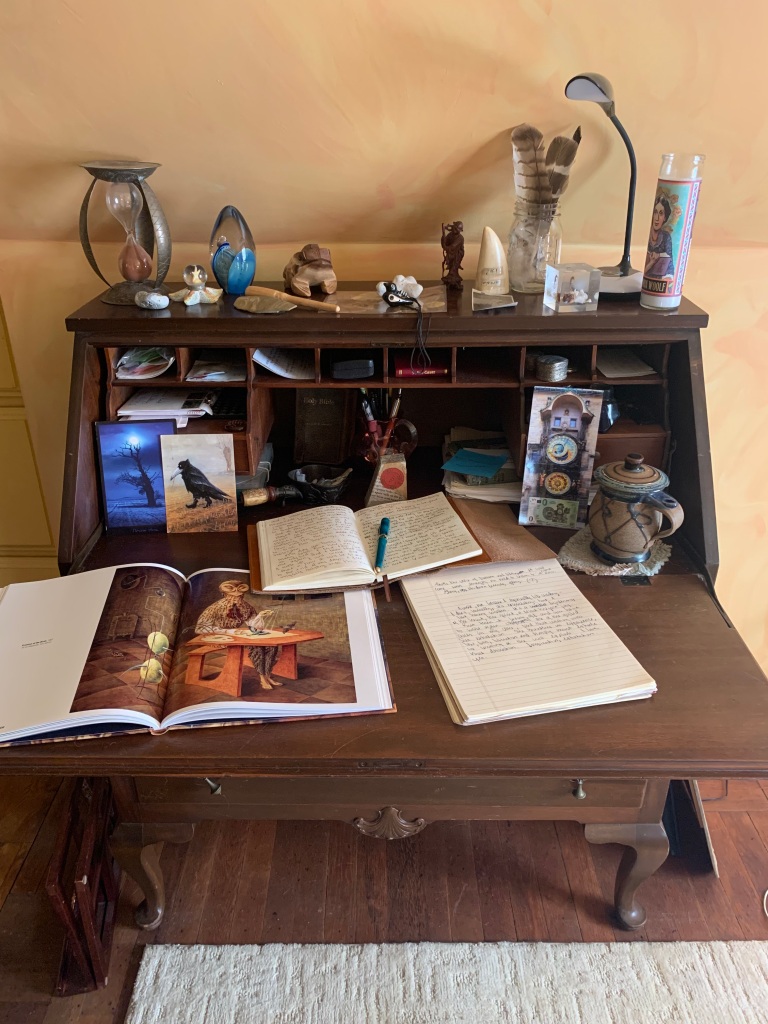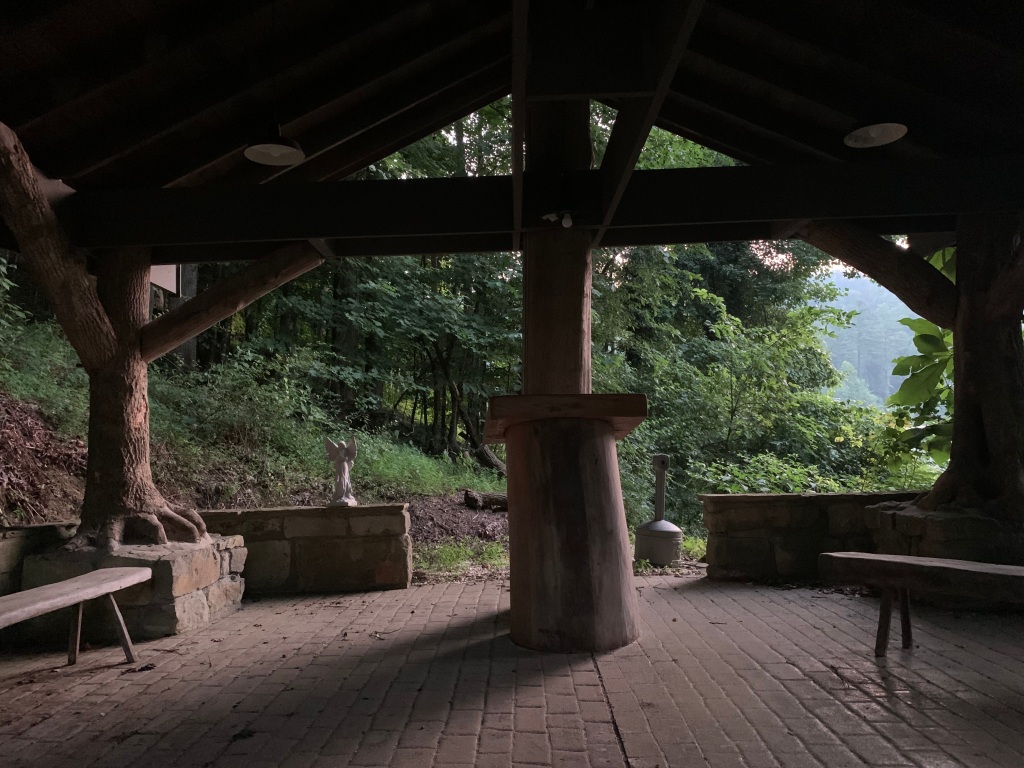Filed under: Eastern Kentucky Flood, Uncategorized, Writing | Tags: Appalachian, Appalachian Writers Workshop, Eastern Kentucky Flood 2022, Floods, Hindman Settlement School, Neighbors
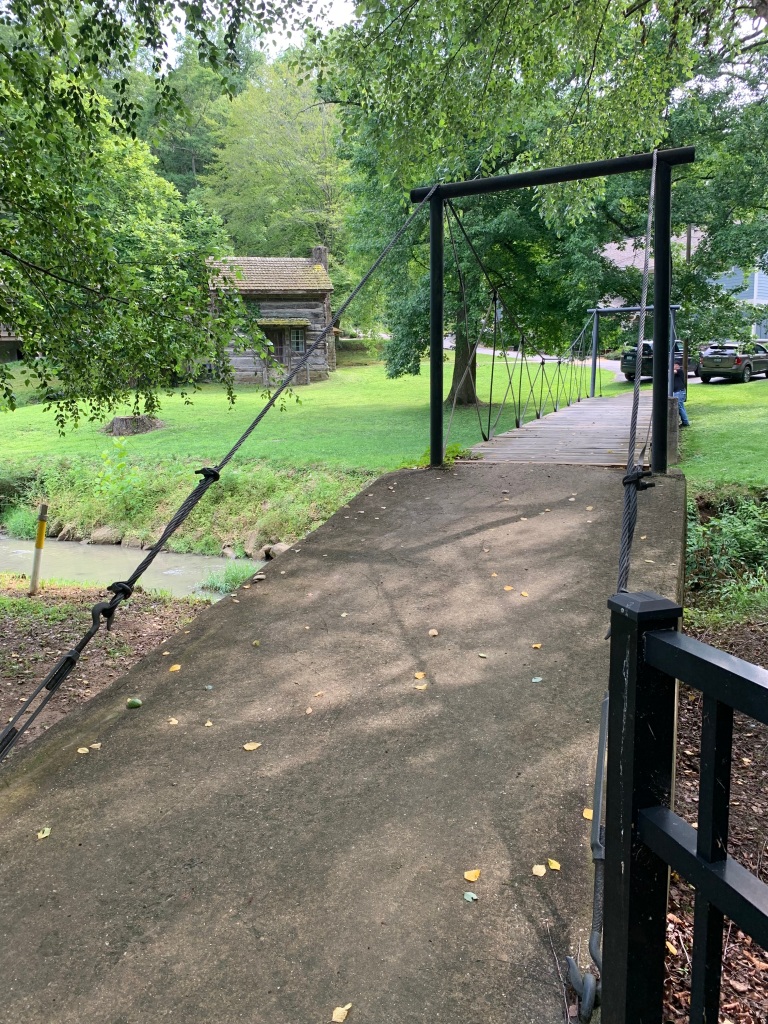
Most summers for the last twelve years you can find me at the Appalachian Writer’s Workshop the last week of July at the Hindman Settlement School on the banks of Troublesome Creek. Like a migrating bird, I cannot help but land at that same place at that same time. I was not born in Appalachia, but I’ve had many rebirths there. As a teenager, long ago, I fell in love with its music, which led me to its literature, then its history, its landscape and its people. I’ve managed to find work there as a teaching artist through the Kentucky Arts Council for months at time in years past, giving me time to learn, time to explore. We often speak of a chosen family, well Appalachia is my chosen home and the fierce, hilarious and talented people at Hindman are part of my family.

The Hindman Settlement School was founded in 1902 by May Stone and Katherine Pettit, educators who were invited by Uncle Sol Evridge to build a school on his land for the benefit of his young ones and his community. There were no real roads, the creeks and streams were your highways. There were few schools and they were far away, hard to get to. This was a truth all over Appalachia. The hills and mountains rise fast and steep, there isn’t much bottomland to build on or to farm. Farmers joked that they scrape their noses on the rocks as they plant their uphill farms. Uncle Sol had a vision- To make a better life for his descendants. He walked more than 100 miles to mail a transcribed letter to Katherine Pettit and May Stone to convince them to start the School. And they came. With the help and support of the people in the community and with help from outside donors, they were able to build a school with houses for boarders, barns for livestock, gardens to grow their own food. They built right beside Uncle Sol’s Cabin which still stands today- a one room log house built sometime in the late 1700’s or early 1800’s.

The School has come a long way since it began. No longer a boarding school, it serves Knott County and beyond through its dyslexia programs, the teaching of traditional folk arts, its burgeoning foodways program that is bringing small farming back into the region and it has been the center of Appalachian literature almost from the beginning. Kentucky treasures Harriet Arnow, Albert Stewart, Jim Wayne Miller and James Still began the annual writers workshop. James Still is buried on the hillside by the Chapel. Writers gather every summer and at times throughout the year to work on their craft, soak up fellowship and to teach each other.
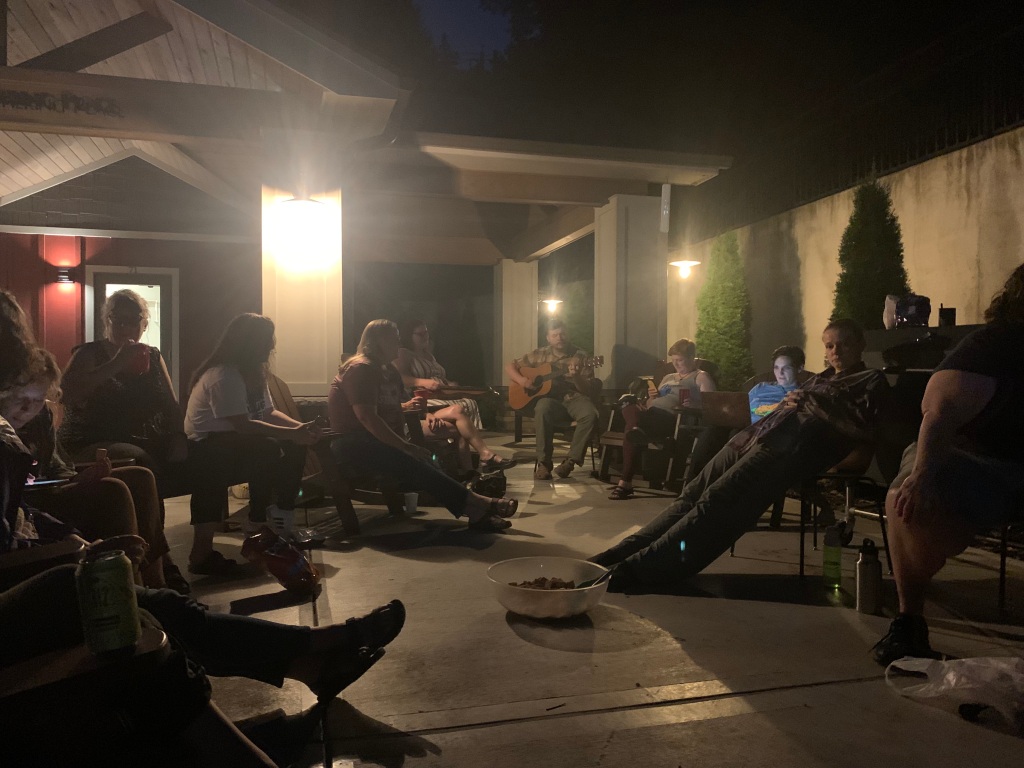
It’s a gorgeous place, a sacred place. Generations of people have made it so. When you are there, you feel that anything is possible and what you have to say matters. When you cross the bridge over Troublesome Creek, you are home.
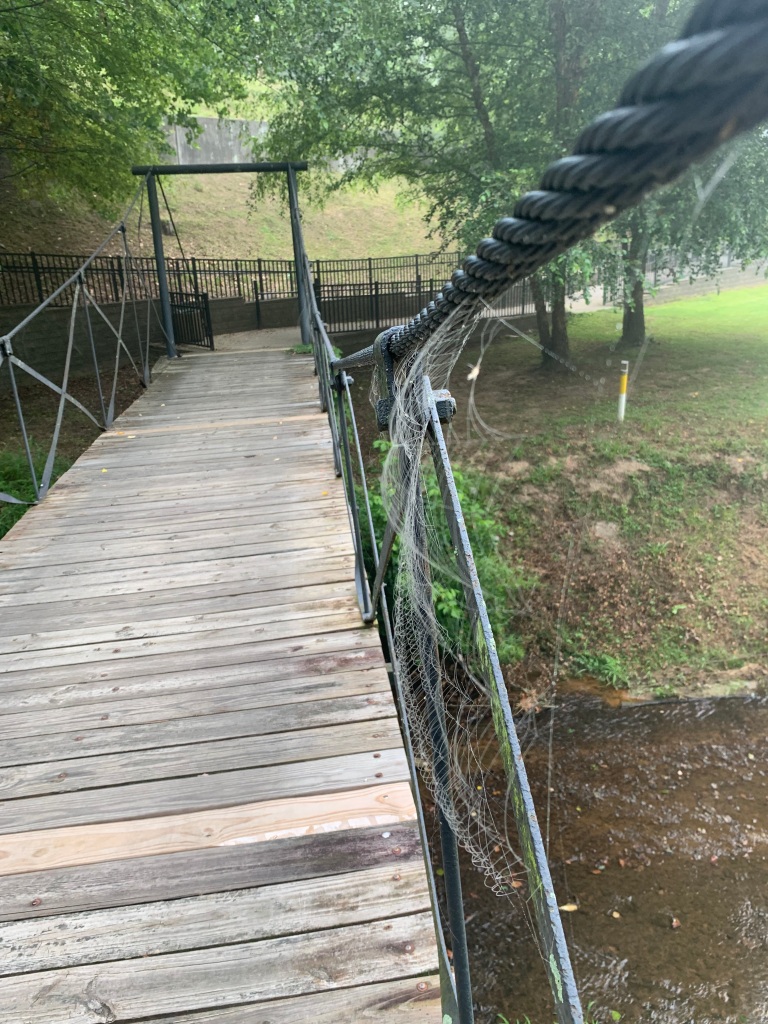
Troublesome Creek. It’s a long long creek, with a couple of branches that meet in downtown Hindman, the county seat with one traffic light close to the school. It eventually flows into the North Fork of the Kentucky River and then on into the Ohio. It’s just a little creek. Sometimes the creek goes dry even. Sometimes it rises fiercely and escapes its steep banks. You can tell it’s a troublesome creek by those steep banks, cut by erosion which is a longtime problem in Appalachia. Logging and mountaintop removal have destabilized the area, making it prone to flash floods. They are a common occurrence, part of life. People know how to live with them, at least they thought they did.

July 28th, I was at the Appalachian Writer’s workshop when the flood came. We were halfway through our blessed week. It had rained a lot and we could see that Troublesome was rising a bit, one foot, two feet, well within its banks. Wednesday was a great day- classes, communal meals, evening faculty readings and a trivia game night. Alerts for flash floods came across our phones, you know, the ones we all have learned to disregard. But that afternoon I told my roommate that I thought she should move her car away from the creek side of the main building. Mine was already on a higher spot. Really? She said. Yeah. Just in case. So she did, finding one last spot by mine. It rained hard all evening through our programs and socializing. It had been such a great day, I had trouble falling asleep. It was midnight when I did. At about 2:30 there was loud knocking and urgent voices, something about moving cars if they were on the low side. I stumbled to the hall, heard them say that Troublesome was rising fast. I went to the bathroom and flicked on the light, only there was no light. The electricity was gone. There was this roaring sound I couldn’t place- I shone my phone light out the bathroom window and could see that the usually bone dry little channel beside our residence, called Stucky House, was a white water torrent of water pouring down from the hillsides into Troublesome. DO something, do something. I started filling all the empty gallon containers in the kitchen from the tap in case we’d soon be without safe water. I filled the bathtub. It was all I could think to do.
The rain pounded, lightning flashed. More and more people were waking up, some heading to their cars. Josh Mullins, Hindman program director was soaked, the other Hindman staff too- all going to and fro trying to make sure that folks in the lower apartments were out. Former Kentucky Poet Laureate George Ella Lyon was in one of those apartments with poet Nickole Brown who had a hunch the world was about to explode. She didn’t go to sleep, but packed up her things at midnight and kept watch over the creek. It started rising so rapidly that by the time she alerted George Ella and helped her pack, water was coming through their door. They landed up at Stuckey, which became the refuge for all the Hindman folks in precarious lodgings. I grabbed my keys and moved my car even further up- driving up the little road that wends its way up past Stucky to the highest house on campus, others followed. People were crying, some had already lost their cars, their trucks, Tamela’s brand new dream BMX motorcycle- they had moved too late. That little tiny creek had risen impossibly fast, higher than anyone had ever seen. Some people stayed inside the living room together, some in their rooms, some on the front porch waiting for the glimpse of the creek that the lightning would give us. It’s over the bridge now, no way out or in. Josh and his team were down in the MIke Mullins Center, trying to pull things to safety from the downstairs offices- the computers, the archives. Josh could see that the creek was up against the new plate glass windows. He was thankful they had put in steel doors when suddenly the creek busted them wide open and all of Troublesome poured in. They got upstairs safely and out the second floor exit.
Emergency lights in Stucky gave us some dim light, there were some emergency lights on the outside of the Mullins Building. There were four white domestic ducks trying to get into a door, a window, anything. They moved as a frantic little group, they had been washed out of the home. There was an overpowering smell of gasoline, underground tanks had been ruptured and the creek was full of gas and propane and oil. It smelled like it could catch fire at any moment.
There was one member of the Hindman staff unaccounted for. Corey, his wife and three young daughters, lived across the creek in a sweet little house. The last anyone had heard, they were trying to get to a neighbor higher up, but they didn’t seem to be home. Their home was flooded and Corey’s wife had fallen and had broken her leg. Then we heard nothing. Phones weren’t working, cell towers were down. All night we huddled on the porch or in the living room, unable to believe what we were seeing. Unable to do anything to help. About 40 people, three dogs and two cats had found refuge at Stucky.
When the sky finally began to lighten at about 6:30, I grabbed my umbrella and walked over to the chapel with my friends Tia Jensen and Carter Sickels to see what we could see. From the chapel by the graves of James Still and Elizabeth Watts, you can see down to the creek, the health department and across to downtown Hindman. This is what we saw-

It was about 7am when I saw Corey walk up the hill to his colleagues. He was soaked and muddy, but smiling. Thank god. They all burst into tears and hugged him over and over. ‘I thought you were dead, I thought you were dead.’ They were all safe, but had lost their house, their cars. Corey’s wife needed medical attention badly. He was trying to get her to a hospital, was looking for a vehicle and hoped there was a way to get through the roads.
The water dropped quickly- faster than I thought possible. In a few hours it had dropped 10 feet or more. I felt sure it rose over 20 feet that night, later measurements showed this was correct.
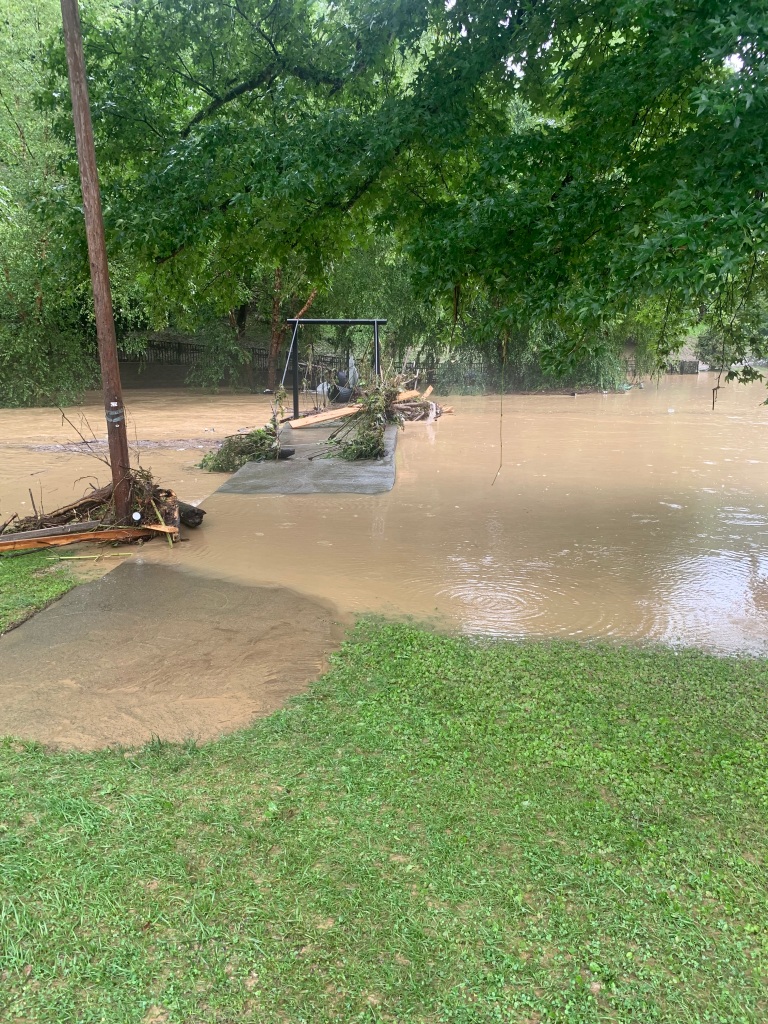


All of us were numb, in shock really. Some cried, others figured out where to stand to get cell service to call their insurance agents. The smell in the air was noxious- some gaseous bi-product that no one should be breathing. No one knew what to do. We workshop folks knew we were going to be in the way- there was no safe water, no electricity, food was quickly going to be a problem. We knew we had to leave, though we could get no information about what roads were closed, what was open. More rains were forecast and who knew if we would be cut off again. There was a window for leaving and we just hoped for the best. People who had lost their cars were taken home by those who still had them. It took all of us a long time to navigate the way out- turning back when a road was washed out, finding another way.
I drove around someone’s home smeared all over the road. It went from life to litter in an hour.

Our part of Troublesome creek rose like that in the middle of the night, in the dark. What is hard to comprehend is that ALL creeks and streams rose like that across 12-13 counties. It’s unimaginable. Truly. So many homes lie alongside the creeks and rivers- there is nowhere else to build. So many communities nestled down in the hollers were scrubbed out by the roaring waters.
We were lucky, us workshop folks. We had homes that were safe and sound, waiting for us on higher ground. Many thousands did not, having now only the clothes they were wearing. And they lost not only their homes, but their neighborhoods, their roads, bridges, grocery stores, churches, businesses, schools. Outside looking in, you’d say they lost their communities, but you’d be wrong. Appalachian people are uncommonly resourceful, resilient and loyal- That is what a Hillbilly is in reality. They’ve had to be. They’ve never been able to count on outside help, only outside exploitation. So they help themselves and each other. I do not discount the heroic and swift efforts of the National Guard who were able to pull over 700 people off their rooftops, but it was neighbors who saved thousands more- wading chest deep into dark houses to get their older or disabled friends to safety, who paddled up in kayaks, canoes, john boats, rafts to get their neighbors off their roofs, who tied each other to trees to keep from getting swept away. It’s neighbors who are now mucking out each other’s house, building their debris piles, sharing their food, water, clothing, anything they have. The restoration work will take years, and it may well happen again. Hydrologists have estimated that water runoff in the area is now 1000 times worse thanks to strip mining and mountaintop removal, and the heavier rains of climate change make this a real and terrible threat.

The very morning that Hindman Settlement School woke to its own loss, they pivoted to become a shelter for others, a center for supplies. They scrambled to find grills and found a way to provide three hot meals a day to the community, even as they were trying to save their collection of instruments and their precious archives, a legacy of Appalachian culture. All over Appalachia, this is happening- people coming together to help each other, a true Water Communion, an ingathering of love and care.
Those of us standing on higher ground have the opportunity of joining this ingathering, of saying “We are your neighbors and we want to help”. That so many people are doing just this, gives me hope. But it’s been over a month now and folks are starting to forget, the news cycle has roared on. I’m writing this now to remind myself, and anyone who will read it, that the flood is not over. Many are living in tents on contaminated ground, others are living in FEMA trailers parked on unreclaimed strip jobs, roasting in the sun, no shade, no way into town, no schools for the children who have nothing else either. It’s time to build schools, homes, businesses. It’s time to build bridges.
To help Hindman Settlement School check out their website: https://hindman.org/
To help rebuild schools, check out Buckhorn and Robinson Elementary in Perry County:
To help rebuild LIbraries check out Letcher County Public Library:
Look at the amazing folks at Eastern KY Mutual Aid Group who brilliantly get money and needed goods directly into the hands of people who need help. It’s neighbors helping Neighbors, but they can use the help of neighbors farther afield. Check out their Facebook Group: https://www.facebook.com/groups/2557126217948530

Filed under: Eating Disorder aka Edie, memory memorabilia re-membering, Uncategorized, Writing | Tags: Anorexia, eating disorders, mental health, Mental Illness, motherhood, Parenting, Single parenting, Thanksgiving
It’s a sunny, cold morning, the day after Thanksgiving. I only have an armful of firewood left, so I’m sitting in the living room pretending that the fire is lit. It’s cozy anyway. We, my daughter Jess and I, took my mother and Jess’s boyfriend to my brother’s house for Thanksgiving yesterday. There were twelve of us, much larger than just the four of us last year at the height of the stay-at-home era. The year before that, we had travelled to Zionsville, Indiana to have Thanksgiving with my cousin and aunt. And the year before that, we were at my brother’s- a dreadful time I cannot remember without pain. Jess was in the full grip of her eating disorder and I was just beginning the long journey of seeking help for her, finding out what treatment options there were, trying to understand what exactly we were dealing with. I was plunged deep in darkness and fear and the agony of guilt. How could I have let this happen? Why didn’t I notice sooner? Why did I take that second job that kept me from home so much? Why can’t I make more money? How am I going to pay for all of this? What can I do to help? You dogpaddle, go under, sink down, fight your way back up for air. Over and over.

It was so very painful at home. Day after day, Jess closed herself up in her room, answered only in monosyllables or not at all, cut herself with blades she’d steal from my pencil sharpeners. She had nothing but contempt in her eyes for me as she fought all attempts to get nutrition into her before the silent, grim drive to school where I knew she’d eat nothing. Intake interviews, meetings with therapists and doctors, directions for what she should be eating, the endless looping fights, the ‘I’m fine, you’re the problem-leave me alone- I hate you-I wish you never adopted me- I wish you were dead’. No life partner to tag team with, no arms to shield me even a little from the attacks that seemed to come from an alien inside her. In the middle of this we had to celebrate Thanksgiving with extended family and with new family from my brother’s recent marriage. What a trial it was. Walking on tightropes, on eggshells, on broken glass, on hot coals. Any of those, all of those. Some of the family knew what was going on, most didn’t. I didn’t have the language to talk about it, didn’t want to cause pain to Jess by talking about it to people she didn’t want to know. She was a long way from being able to talk about it herself, a long way from admitting that starving herself was wrong. She was a long way from even being herself. Mental illness is the devil.
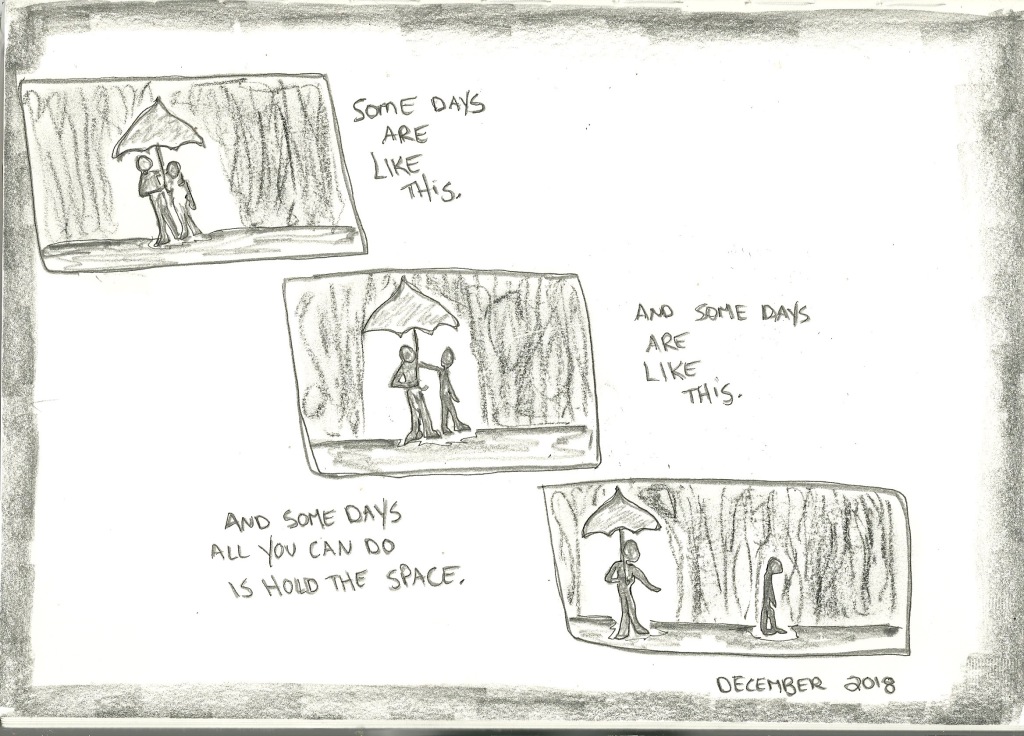
Sitting here in the peace of this beautiful day, the panic and fear I felt then rise right back up as I write. Within a week or so of that dreadful holiday, it was clear that she needed to go into residential treatment. McCallum in St. Louis was recommended. It was a race against her 18th birthday- I had to get her well enough by her birthday in February to recognize the severity of her illness and the value of continuing treatment, or she would walk away from it all and cling fast to her anorexia, choosing it over life. I’d then be in the position of taking her to court to get medical guardianship. That Thanksgiving was the beginning of very dark months.
I’ve always been an intensely private person. Something I have always kept to myself was my pain. A lifelong habit, a reflex. Snapshot: My brother and I have spent the morning down the street in the tot lot, sent out to play because Daddy was ‘sick’ and needed a quiet house. I was six, maybe seven, my brother was four or five. Dad had come to get us, calling us when he was within earshot. We went to him and then walked toward the house. Out of habit, I reached out my hand to hold his as we crossed the street and met the lit end of his cigarette. The cherry ember lodged under my thumbnail. I whipped my hand away and held my fist behind my back. ‘Oh baby, are you alright?’ he asked. ‘I’m fine’ I lied. I remember feeling embarrassed. I remember feeling it was my fault. I remember not wanting to make my dad feel bad, even as my thumb burned.
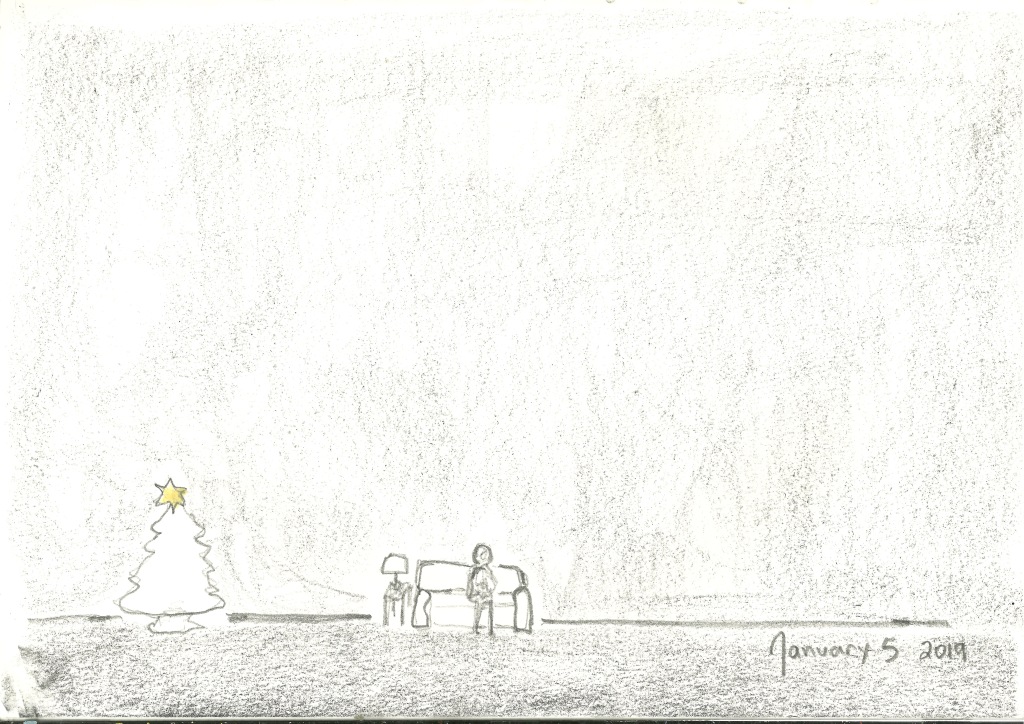
That Thanksgiving, the dark months that followed, I let go of that silence. I let the people at my jobs know what I was dealing with. I knew I needed to talk about it, be open about her illness. For her sake and for mine. I didn’t want her to be ashamed of it I didn’t want her to blame herself. If she was going to get better, she would have to embrace it, accept help, talk about it. If I was going to keep myself from coming apart, I was going to have to do the same. I had just started sharing art again on this blog as a practice, as a source of fun. Those drawings reflected a little of that early pain. I didn’t start writing about J’s journey with Edie, the demon Eating Disorder, until her return from residential treatment.

The writing helped, the talking about it helped, not having to pretend that everything was okay helped. My family was there for me. My friends were there. I was still falling through space, but not quite so afraid. There was so much to navigate- working with her high school, would she still graduate? What support could she get at school? Would they accommodate her half-day group therapy treatments? The looming 18th birthday- would Jess sign on to continue treatment? That was a terrifying day, skillfully handled by the doctor she loved. Jess signed the papers, she would continue therapy. My knees were literally weak as I walked out of the doctor’s office to drive to school. I was still working two jobs- full-time drama teacher at Walden School and part-time Director of Religious Exploration at 1st Unitarian Church. I was in the middle of directing Mary Poppins, for chrissakes, the all-school musical involving 85 K-12kids. I was told I should join a parent support group, should get therapy myself- but when? When? I wrote, I shared, I made art, I talked. It helped.
It’s been three years. She is in college now, studying early childhood education. She has joined a sorority, has a part-time job. She has worked hard, very hard at her recovery. There have been trials, setbacks, additional diagnoses, medication changes, trips to the emergency room, progress, many tiny victories, several larger ones. After three years, we are back at Uncle Will’s, back with family after a long Covid separation. It is Thanksgiving and there she is- Jess, herself. Smiling. Cheerful. Helpful. Funny. Beautiful. Proud. Her plate is full. My plate is full. Thankful, so so thankful.

Filed under: Art of the Day, Uncategorized, Writing | Tags: Art of the Day, Autumn, Dawn, Dusk, meditation, neighborhoods, Owls, sanctuaries, The Weekend, traffic noise, Writing
Men and their leaf blowers have no love for the unwinding of the day as the sun slips down between late afternoon and evening. I shake my fists at them and walk by with my middle fingers in my ears. I know I am invisible to them, all they can see is their task. My neighbors in the big white farmhouse have set up a long, long table in the middle of their yard with white linen and enormous candelabras. I expect the Mad Hatter and the March Hare will arrive soon followed by a sleepy Dormouse and then a befuddled Alice. It is a delightful sight. It’s a Friday night and once again I am home alone, breathing a sigh of relief. My week is always so very full, so many students, colleagues, all in motion, a buzzing hive of exploration and things that must be done.

Home again from school and from retrieving my dear old cat Piper Rose from the vet I set some things right in the house and step out again with my binoculars and field bag holding my eyeglasses and journal, intending to find magic, intending to take my time walking and looking at the world as if it were new. Remembering the owl’s song this morning, calling from the languishing black cherry in the back of my yard, I do not go far. I can hear the cars rushing along Brownsboro Road, folks hurrying home to their weekend, blind to everything thing else- I don’t wish to be swept into their current. I walk slowly around the little wood behind my garage, then slowly around the block, letting the tiresome leaf blowers complete their tasks. I sneak up the wooded lot next to the new neighbor who has never actually moved in, though she bought the house back in May. I stop every few steps to look, to see, to take a breath. A pair of young squirrels run off a tree in a game of chase, one of them nearly runs up my legs as if I were another tree but swerves at the last moment, unconcerned that I am human. It makes me smile, I feel honored. Now, here I am at the picnic table in the little wood where no one ever sits except me, once in a blue moon.
The trees are so patient. I sit and wait with them. Still holding their summer leaves for a little while longer, except for the tall black cherries who are starting to let those tired old things go. The green is giving way to gold and yellow, other colors creeping in. The sun is setting soon. I look for the owl and hope to hear its call before I head into the house. I wait, the trees wait, the traffic roars in the distance, the crickets sing, the breeze disappears, voices from Alice’s party grow merrier and louder as the guests arrive. Owls do not care for parties. There’ll be no calls this evening, but I’ll be back before dawn.
Saturday morning, I am here and so is the owl. Alice’s party has been long dispersed, the tea has grown cold. I woke at six, fed the clamoring cats, put on clothes to protect me from tick and chigger and mosquito, picked up my binoculars, journal and a little lantern and stepped quietly out the art room door to the call of the owl, sitting high in the black cherry, my old friend Orion shining in the sky behind it. Good morning, my blessing.
I’m at the table writing by the light of the lantern, the night insects sing. The owl moved from the cherry into a tree here in the little wood where it sang a while longer and then grew silent. Perhaps it has moved on. Perhaps it will come back. I hear the distant hum and thrum of the roads, even early on this weekend morning people have places to be that aren’t where they are. I dream of living where I cannot hear them, cannot hear their busyness. I dream of living where the song of God quiets the noise in my head.
I do love it though, my house on the hillside, my willful yard, this hidden little wood and lane behind it, right in the heart of Crescent Hill. I love that owls live here, that foxes and deer have made their way here from time to time. Raccoons, possums and rabbit are longtime residents. I love that I can walk to the library, bookstore and bakery, to Oscar’s hardware and Tammy’s consignment shop. I can stand in the road and talk with my neighbors, be part of block parties and celebrations. It is good, so good. The stars peek through the trees, the sun won’t be up for another forty-five minutes or so, the night sings on.
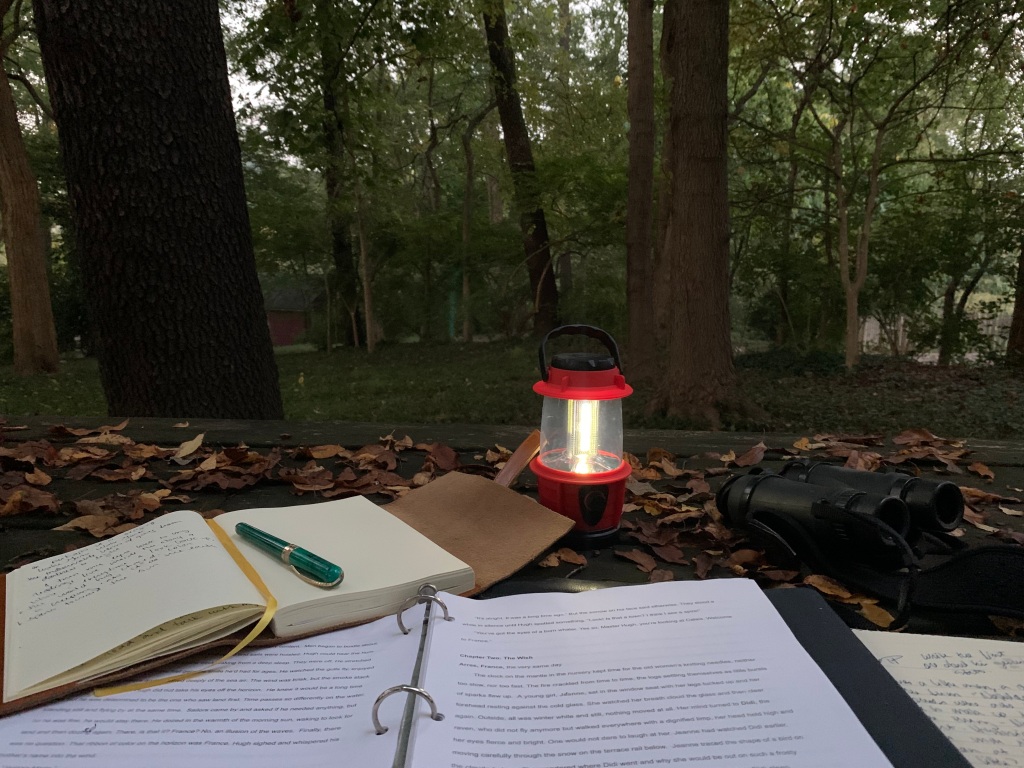
I’ve been reading The Tapestry Room, the book I am writing, here by the lantern light. Little insects make their way across the page, I note their progress. I look up to see the morning light creeping in. Suddenly a bird sings, she has seen the dawn too. More birds are joining in. I can see the ground more clearly, can hear the traffic grow louder, more insistent on its importance. The stars have disappeared. Night’s song is over- not quite, not quite- the owl is back, calling ‘who cooks for you? who cooks for you?’ I do, my friend, I do. I turn back to my reading, live inside the world that is as real to me as any. Each time I look up from it, the outside world has changed. Color is creeping into it as the earth turns toward the sun.

My neighbor Bob just walked past on the little lane, off for his morning walk and coffee. I don’t think he even saw me sitting here. I turn off the lantern, useless now, and go into the house.
Filed under: Art of the Day, Uncategorized, Writing | Tags: Adriana Trigiani, Appalachian Writers Workshop, George Ella Lyon, Hindman Settlement School, Making Art during the Pandemic, poetry, Writing
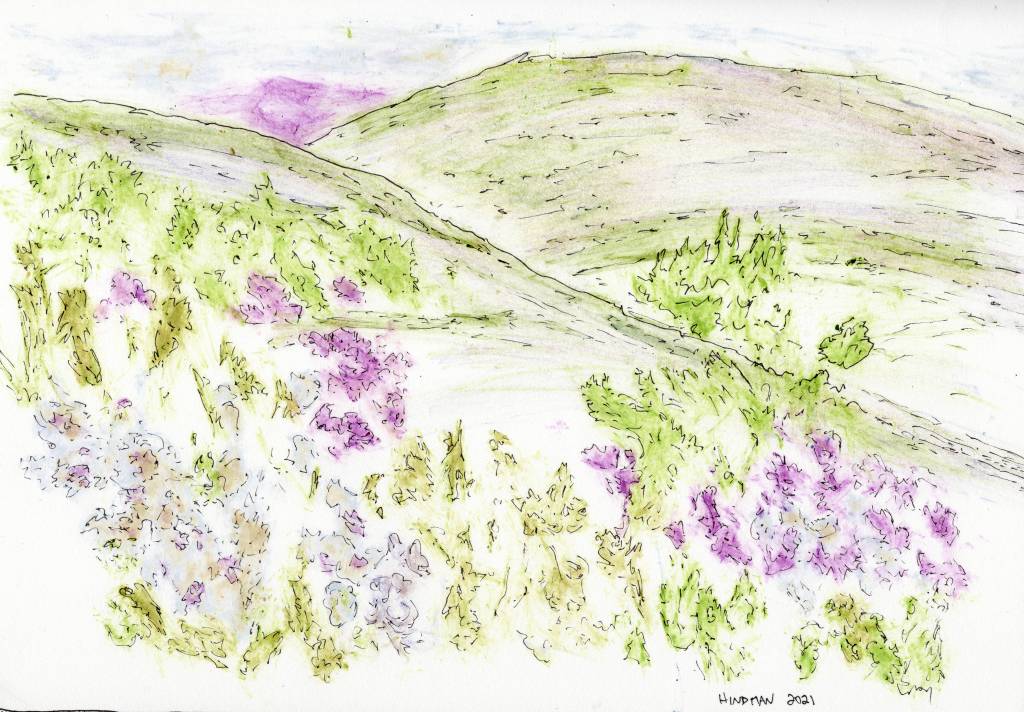
“You gotta make the work sacred,
because it happens to be sacred.”
-Adriana Trigiani
Adriana Trigiani was the keynote speaker for the Appalachian Writer’s Workshop at Hindman Settlement School this year. On Zoom she was powerful, intimate, dynamic, funny, full of respect and truth. I’d want her in my corner when I’m on the ropes. She’d find a way to get me up and fighting again.
Here’s the struggle- for one almost whole week I had the great gift of being at the writer’s workshop there at Hindman where all my needs were met- really delicious food (dessert with every meal!), a lovely room, inspiring and generous teachers, trails to explore, quiet places to sit and think, a beautiful campus rich with history, and a community of old and new friends all working to shine some light in this world. All week we were surrounded by beauty and art and heritage. We were in a place that has a long history of lifting people up. It is sacred ground, truly. And now I’m home.

Last year I attended the workshop online along with everyone else. Hindman did a great job with it, but we all felt the loss. At home, I tried hard to make the time sacred and for moments I could fool myself that I was there, lose myself in the readings, the discussions, the sharing. Just hearing everyone’s voice was enough to keep me afloat. But there was always the moment of hollowness when the Zoom screen disappeared and there I was sitting alone at home about 30 seconds away from having to take care of something or someone. I remember sitting there feeling like all the water just drained out of the tub. It was heavy work hauling myself out and putting myself into motion again. I do not think I was alone in feeling this. I know I wasn’t. And I know that those who attended online again this year felt it again, even more so. It just hurts.
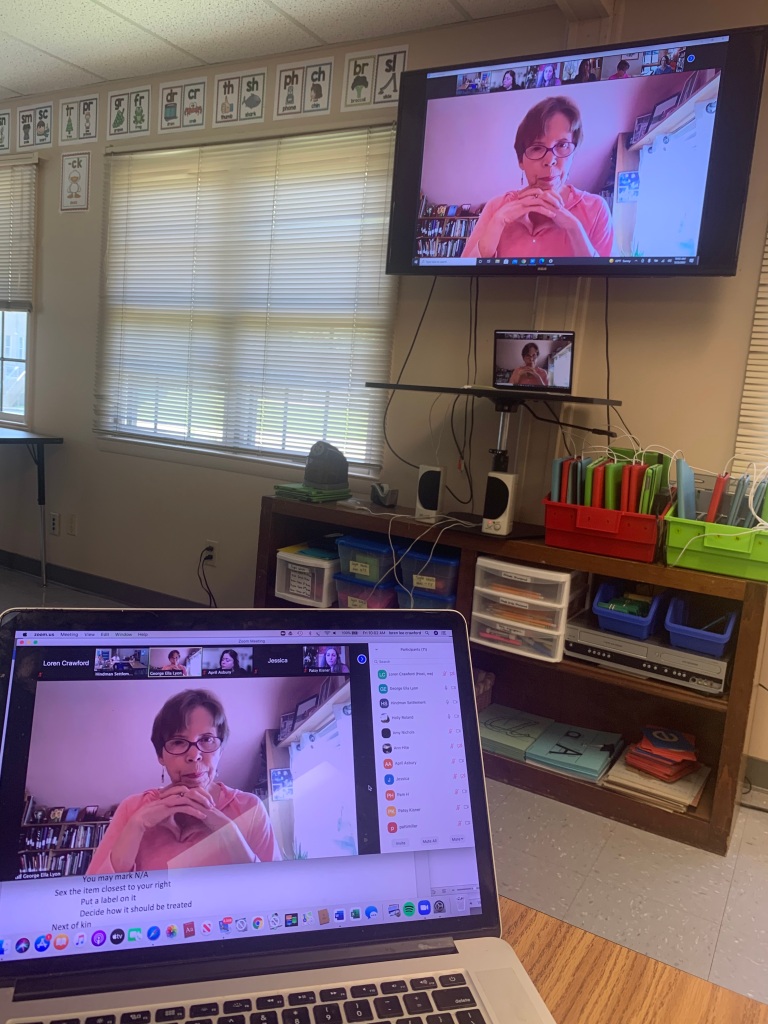
Lucky, so lucky to be there this year. It was an oasis I badly needed, an oasis I hated to leave. The degree to which I am mourning it shocks me- do I really dislike my life so much? The one I made all by myself over all these years? Of course not. But there are so many things I dread and even despise about what everyone agrees is the necessary business of life. Not so long ago I wrote in my journal that as I lay dying (someday far far from now) that I will toss bouquets to heaven, rejoicing that I will no longer have to fill out financial aid forms, file taxes, pay bills, navigate mortgage refinancing, fight property valuation increases, rob Peter to pay Paul. ‘Hallelujah!’ I will shout- or gasp, or whisper or maybe just think- ‘I can just be me again!’
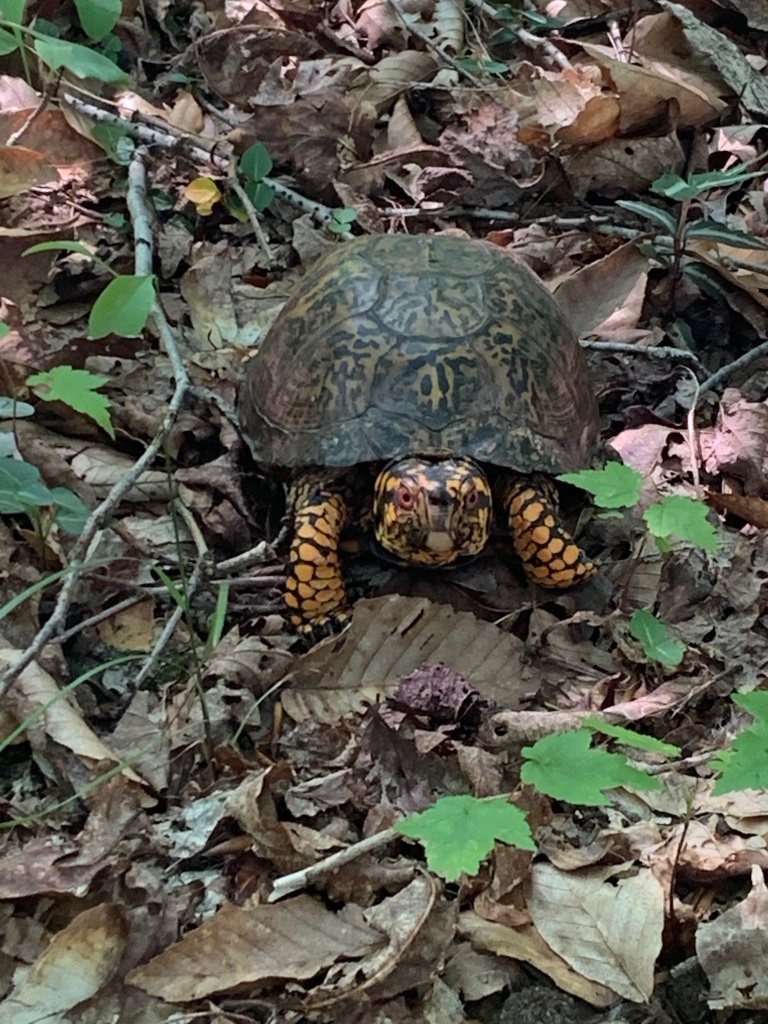
That’s what it felt like this last week. I was just me. Not responsible for anyone else. I am amazed at how little I thought of my family, those I’ve lost, even my daughter who is everything to me. I forgot all week that I was a mother, a daughter, a teacher, an employee, a homeowner, all of it. I allowed myself to simply be. I didn’t have to justify the time I spent reading, writing, listening, making art, exploring or simply looking out into the distance for long periods of time. I mean justify it to myself because it’s mostly me looking over my own shoulder saying ‘don’t forget you have to… remember to… it’s been a long time since you… you really ought to- clean, cook, shop, weed whack, visit, call, pay, plan, work your two jobs since that is what pays you.’
I am not alone or unique. It is what many experienced at the workshop. This glorious week and then we go home floating high with what we have learned, experienced, created. And there are our lives waiting for us to pick up the reins again. How do artists, writers, dreamers keep it all going? Those dear mothers of small children have an especially hard time because finding time to write feels like stealing time from your babies. Say what you want, that’s what it feels like and how can anything beautiful come from what is stolen? I remember well that precious, tender, terrible time. We talked about this in our last class with the remarkable George Ella Lyon who is a wonder and a gift. She walks us through our own mansions with an enormous keyring at her waist unlocking door after door for us, saying ‘here, did you know you have this room in your house? Now you can come in anytime.’ But on our last day, many of us were despondent- how on earth can I even find that room again once I get home?
I have some thoughts on thresholds and doors you can close. When everything shut down in March 2020, we all went home. It was exciting at first, an adventure, something new. I require solitude, crave quiet. The busy-ness of traveling here and there, being split between my two jobs can be very wearing, so being at home really appealed to me. In some ways life was more peaceful, in other ways it was maddeningly loud inside my head. Suddenly there were no boundaries between work and home, between my two jobs, between my family and my writing life. No thresholds to cross, no journeys to help reset and refocus for the next task at hand. There were no doors to close to keep the outside from coming in and I felt I had to be reachable at all times. Tethered to the computer screen, I worked to figure out how to teach theater online, how to have Sunday school, how to keep children from feeling the way I did- unconnected, unreal, unimportant. Truly maddening.
My office at home isn’t a room exactly, more like an odd-shaped hall at the top of the stairs leading to other rooms, a feng shui nightmare as energy hemorrhages from that space. It’s okay for business type stuff but not for the deep dive needed for writing. I fiddled with spaces all last year- found the best settings for my various zoom classes, rearranged furniture, created a writing space in my bedroom where I actually have a door to close. I designated different desks in the house for different endeavors. I have a ridiculous number of desks, perfect for someone who habitually takes on too much.
So here’s the current line-up:
The Business Desk: At the top of the stairs. It is an office type desk with filing cabinets that I bought at Big Lots ten years ago. It’s for businessy type things, including my work for school or the church.
The Letter Desk: Not six feet away is my childhood dresser desk, a Victorian affair with drawers and a desktop you lower to reveal cubbyholes. For letter writing and my international postcard obsession, for correspondence of any kind that involves paper and pen and the stamps that I love so much.
The Poetry Desk: A small cherry school type desk with a sloped top that I got in a neighborhood second-hand shop. It sits in a window dormer to the right of the Business Desk. It has been largely ignored these last couple of years but it is reasserting its importance.
Lap Desks: I have these two very old pressed cardboard lap desks that I got when I helped my cousin clean out an old relative’s house decades ago now. They have held up remarkably well. They travel out on the patio if it’s nice or beside the fireplace if it’s cold or in the armchair upstairs that looks out into the yard if I want to keep an eye out for the birds and the postman. This is where I do most of my journal and blog writing and my reading.
The Magic Desk: In my bedroom/meditation room with a door I can close, a gift from a family friend long ago. It’s an antique secretary desk with a drop front and cubbyholes, like the letter desk. This is where I work on The Tapestry Room, a historical fantasy novel for young readers. Here is the one place in the house I can close the door. If I mindfully cross the threshold into this room, say ‘I am a writer entering a sacred space’, the chatter in my head quiets down. I close the door, take the three steps down in to the room, play the music that is my touchstone and almost immediately the peacocks swish their tails and I can enter the world of the book.
By moving from desk to desk, I can change gears and officially set aside the thoughts that do not belong to that desk. It’s how I trick myself into focusing and mostly it works, helps keep my work separate and clear. It helps to make a little room for the private work of my soul. I write, not because I especially like writing, but because I love having written. It’s a lightening of the heart, the spirit, a secret bright joy. But then that feeling wears off and you have to write again. Patsy Kinser, one of the remarkable poets in my class, said that writing is her exhalation. She breathes in life, loss, love and exhales poetry. I love this. Inspiration, exhalation. Yes.
In her keynote, Adriani (I feel we are on a first name basis now) told us to set our alarms two hours earlier to write, fresh from sleep, before the world starts making demands. She said to create a sacred space for writing, even if it’s just a corner of the kitchen table. A woman after my own heart, she advocates getting dedicated notebooks for projects- no writing the grocery list or the household chore to-do list in the novel notebook. She said ‘Love everybody, take care of everybody, but put yourself on that list too’. Over and over her message was: Don’t waste time, don’t kick that can down the road, you’re feeling pretty good right now- get it down. Don’t. Waste. Time.

Making time to write is very difficult, then actually writing is harder still. The world leans in hard telling us that what’s in our hearts and heads can wait, isn’t important, will never lead anywhere. That’s the voice of Death. It will come soon enough, no need to listen to it right now. Write. Glory.
Filed under: Art of the Day, Uncategorized, Writing | Tags: Death of a pet, Dog, Mr. Darcy, poetry

Mr. Darcy, a great friend to everyone, is gone. He died at home, where he always longed to be, after a sudden and catastrophic decline. He did not suffer long and that is a great comfort. He was the sweetest and the most loyal lieutenant, a good boy to the end. He was an exquisite artist in his younger days, pure poetry in motion as he played frisbee. He could spot a rabbit in the dark at 50 yards, alert us quickly to anything unusual happening without making too big a fuss, and was a patient mother to a number of kittens over the years. A friend to all cats, mail carriers, neighbors, visitors, small fluffy dogs and his best pal Johnny, Didi will be sorely missed. He loved his family most of all, and never left my side, even if I wanted him to. Separation was his greatest trial. It is a blessing that his passing took place at home, in my room, where he has slept for the last ten years. May his great spirit be Home at last.
I wrote the following poem yesterday as part of a class on epistolary poetry I am taking. It helped, a little.
Dear Cindy,
friend poet,
.
You write of the peace
of butterflies
And for a moment
I am filled with breath
Like the opening of soft wings
And it is a balm.
.
I never knew
How soon the tongue blackens,
How quickly the limbs stiffen,
When life has left.
I never knew,
As my body knows now,
What it means to move
dead weight.
.
Our sweetest boy,
Died in the night
By the foot of the bed
At his post to the end.
.
Frozen rain hits the window,
The hearth fire crackles,
All I see is where he ought to be but isn’t.
.
You write of wild horses
And warm empty beaches,
Of bioluminescence and butterflies,
.
I take a breath,
Feel the soft wings flutter.
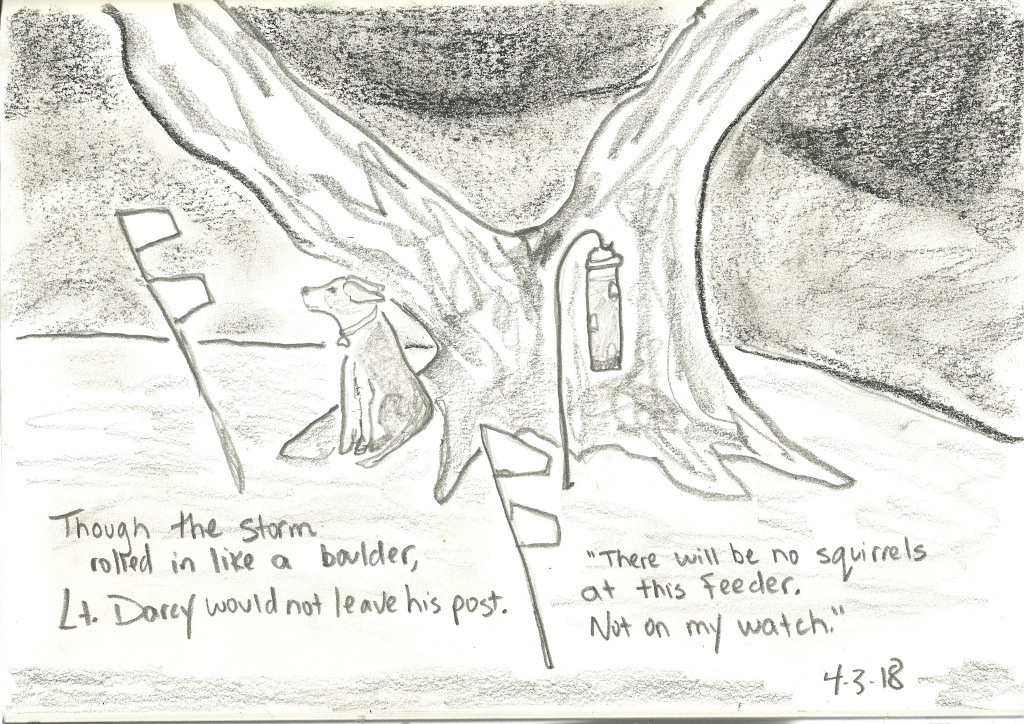
Filed under: Art of the Day, Writing | Tags: dear friend, Ice storm, poetry
Were the world arranged solely for my pleasure
most winter mornings would begin like this one
with a slow dawn on a fine snow blanket
covering the ice that fell
all night long
leaving the roads
blessedly empty of their daily business
because the stakes are just too high.
.
I am thankful for the quiet
for the gathering of cardinals
so grand against the winter white
for the way I must plan each step outside
turning the morning walk with dogs
into a small pilgrimage
as the mind is bent on exactly now-
snow crunch silhouette of trees
twinkling ice made prisms of the dawn.
.
I am thankful that I can lay a silver branch before you
from the land where all night long
twelve princesses danced through their shoes.
.
Good morning my poet friend.

Filed under: Art of the Day, Writing | Tags: Cave Hill, Cemetery, COllage, Dianne Aprile, Haiku, mental health, pandemic, The First Bloom
I have loved Cave Hill Cemetery all my life. I grew up a few blocks away and have been exploring it now for decades. It’s close to downtown Louisville, but is hundreds of acres over rolling hills, sinkholes, an extensive cave system, a rock quarry and a few lakes fed by springs. It is an arboretum along with being an historic cemetery and the final resting place of over a hundred thousand souls. Some are known names like Muhammad Ali, George Rogers Clark, Colonel Sanders, while others are names long forgotten like hundreds of women and children cast away by society, and thousands of men thrown into the teeth of the Civil War. There are endless stories at Cave Hill. A few days ago I took a long ramble there, thinking my thoughts and feeling the presence of a friend long gone. I chanced upon a tree by the lake that was actually blooming- so early! So unexpected!

That evening I took part in a workshop on Zoom called “Writing with Scissors” facilitated by the delightful writer Dianne Aprile. In it we explored a few forms in which we could combine collage with writing. Creating collages is deeply comforting, something about the action of cutting and pasting is healing. Unexpected relationships emerge, the sum always greater than the parts. I wrote a Haiku about the morning’s walk at Cave Hill and created a small collage triptych in the form of a little book.
This is the front:

It opens to this:
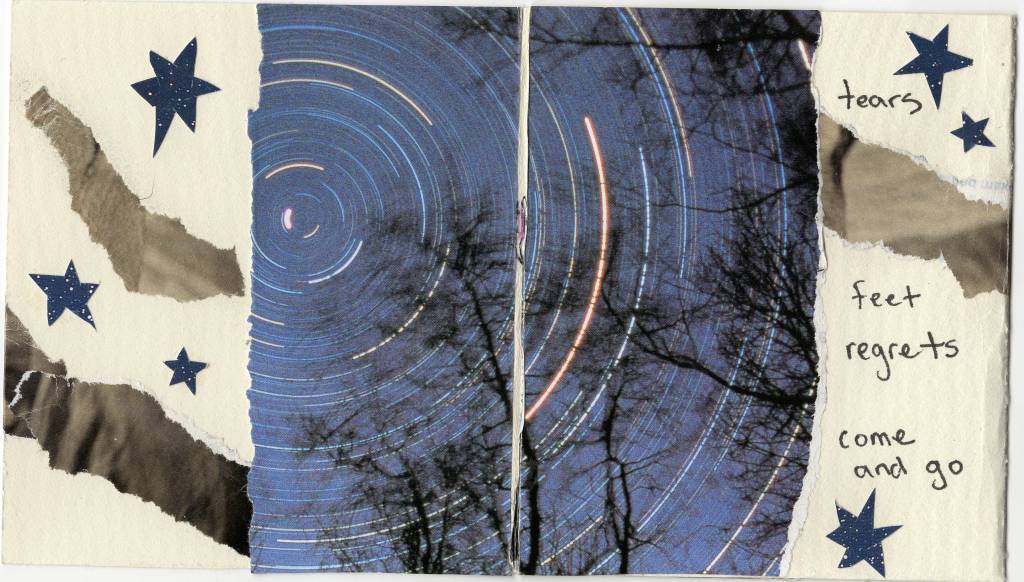
Then fully opens to this:

The back of the above page looks like this:
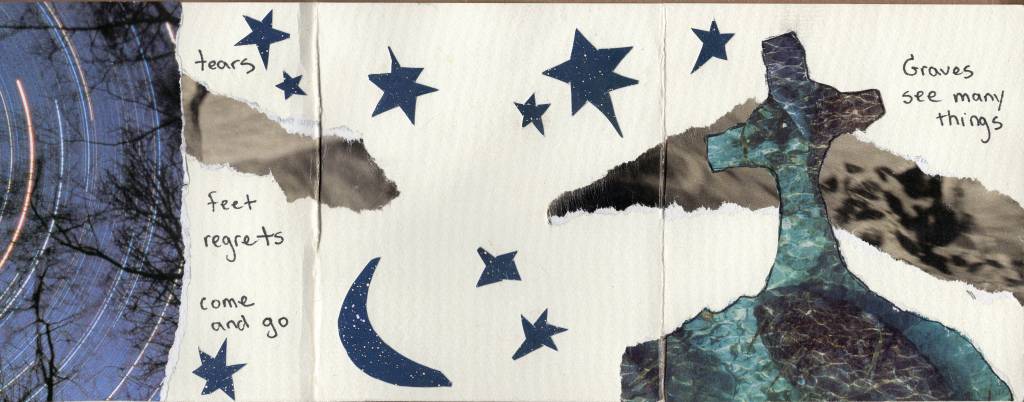
The day was a balm. It’s been a year of walls closing in, anything that opens them up is a great blessing.
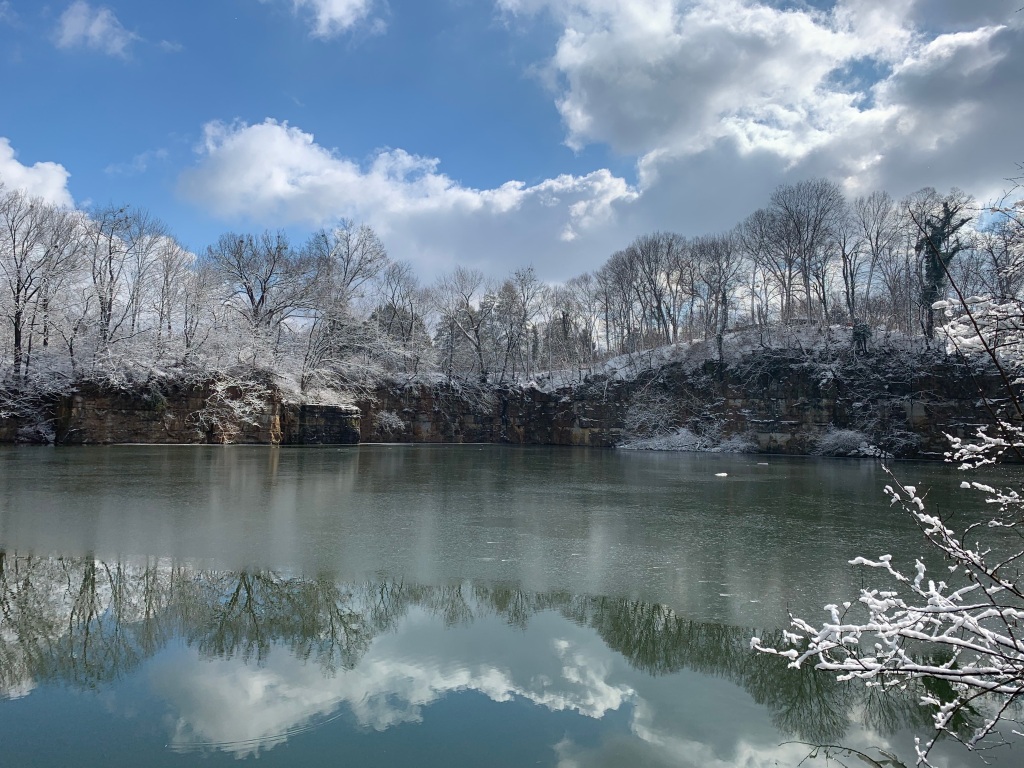
Filed under: Art of the Day, Writing | Tags: 2020, Fountain Pens, New beginnings, Waterman Pens, Writing

Notes from my journal
A new journal, a new journal cover, and a new pen. Or at least a different pen. I am at a sudden loss. I feel unmoored and adrift. My beloved Waterman fountain pen is no more, after decades of service. It was not in great shape. The cap was cracked, held together with super glue. The clip on it had been bent and was loosening. A while back, Waterman, in Paris, offered to fix the cap for me if I could find the original receipt or certificate, but I could not find it. And I could not stand the idea of shipping it off and being without it for so long. So I kept it. It was not in great shape, I admit it. Still, I thought I would be writing with it the rest of my life. Then a new journal was delivered and I went upstairs to gather my pen, the journal I was just finishing and my glasses (I retrace my steps, replay this moment over and over in my mind). Coming down the steps, my pen flew out of the temporary case it was in for safety (my black leather pen holder has disappeared somewhere in the house in the last month and I cannot, cannot find it- was this a sign, a portent I should have seen coming?) The pen flew out of that velveteen pouch, hit a step that knocked the cap clean off, then went into a perfect swan dive onto the tile of the kitchen floor below bending that gorgeous 14k gold nib back like eyelashes. It was a trajectory that would be impossible to recreate. Honestly, it felt like the hand of God smote that pen out of my hands.
My heart stumbled when I saw what had happened to the nib. I did try to bend it back but it was clearly never going to write again. There’s no going back, only going forward. But it hurts. That pen has been my constant companion since 1998. It‘s been everywhere with me, all around the United States, to Canada, Europe, Asia, Central America and South America. It’s helped me navigate both joy and grief. It’s what I write with. Plays, poems, journals, papers, essays, notes, letters, lesson plans, stories. My Waterman fountain pen with the gold nib. It was a tremendous expense when I bought it for myself at the start of my life as a solitary, after my divorce from Patrick. I knew I was embarking on an independent life, a new journey, though I didn’t know at the time that it would, in fact, be a solitary one. The pen was a gift to myself, one I saved for, bought from an ancient pen store on Jewelers Row in Chicago. I do not believe it is still in business.
The death of this pen seems to be a portent, all of a piece with these tumultuous times. Nothing is the same for any of us this year, either personally or nationally. The old ways of doing things have been completely disrupted. I am making the choice not to mourn its loss- the pen, the old way of living and working, the old way of seeing the world. It is a new beginning for me. I think. While I am as solitary as ever, I am more connected in friendship with others than I have been in years. I seem to be extending myself to others in ways I haven’t had the energy for in a long time. I feel a generosity of spirit in myself that I have long missed. I am learning to value and respect myself, even to love my Self in ways I don’t think I ever have before. Belief in my work is growing, as a teacher, as a writer, as an artist. Perhaps it’s only right that I lay my dear workhorse friend to rest and take up a new pen with which to explore the gifts of these troubled times.
Right now I am writing with a pen I bought at the Crescent Hill Fourth of July fair a couple of years ago. It’s a fountain pen made by a local craftsman. It’s heavier than my Waterman, though the weight is not unpleasant. The nib is finer, and though gold in color, is not gold in fact. It’s marked “iridium German nib” but a little research reveals that to be a false claim too, like the gold color. It’s a steel nib, made in Asia, and it scrapes on the surface of the paper, not like the smooth effortless flow of the Waterman. But it will do for a while. A great deal has been lost these last four years, and this current year is one for the history books. My heart, like so many hearts, has been heavy, yet somehow I feel lighter tonight. My beloved pen is gone but I can feel there is a gift barreling down on me and I will accept it with joy when it comes. The right pen will come to me and I will feel that I am meant to have it. What’s more, it will be a gift of love.
Filed under: Art of the Day, memory memorabilia re-membering, Writing | Tags: Breonna Taylor, drawing, Flowers, meditation, Protest, Ruth Bader Ginsburg, solace, The Great Circle
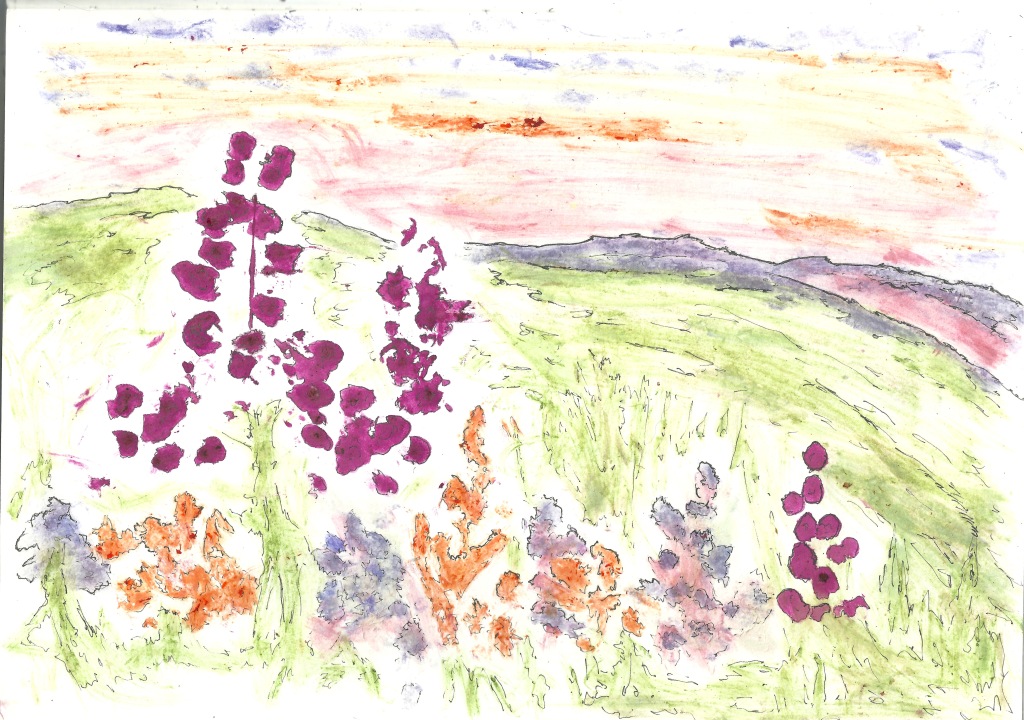
Monday evening, September 21st 2020
Ruth Bader Ginsburg died a few days ago and like so many, I’ve been battling the waves of darkness that threaten to pull me under. It’s a truly awful time. I am not alone in feeling that our democracy is in real peril. I have taken it for granted all my life. I believed our system of checks and balances so carefully constructed and time tested that it could withstand anything, anyone. But I am wrong. The constellation of evil, the triumvirate of greed, bigotry and ignorance that is holding sway in positions of power, is sweeping all balance away. Every day we grow sicker, angrier, more divided as a nation.
I cannot write of it anymore this evening. I remind myself to breathe. I make myself look around, see where I am, see the goodness that is all around me. It’s grown dark. I sat outside in the dying light drawing until I couldn’t see my marks anymore. A clear cool night, the insects sing and bats take to the sky. The hummingbirds have not all left yet, but soon. Inside now, I sit in my dad’s leather armchair, the one he bought when we lived in the grand old house on Cherokee Parkway. I remember it was a big purchase, a long considered one because of the expense. It has a matching leather ottoman too. He bought it for the library where he could sit and read his papers, his endless line of Civil War books, Lonesome Dove. He was an infamously slow reader but a steady one. Dedicated. He always said that his reading was ruined when he took Evelyn Wood’s speed reading course in college. It took him two years to finish Lonesome Dove, but he kept at it. It makes me happy sitting in his chair, the worse for wear, the better for memories.

Drawing brings comfort, especially the land drawings. It was my friend Reba Rye who first showed me it was possible to gather up things around you with which to draw. You needn’t be dependent on what you can buy in a store. Such a simple idea and yet it was a revelation to me. You can take leaves and petals, press and pull them across the paper. Charcoal from fires, red dirt, certain rocks are good too. Lately I’ve been gathering plants on my evening walks- flowers that grow in the alleys, leaves along the railroad tracks. Sometimes I surreptitiously pull off the heads of flowers that grow on the edges of my neighbors’ yards and slide them into my pockets. I only take them if they won’t be missed, if they are drooping and ready to fall, part of a profusion of cosmos, sunflower or crepe myrtle. I’ve some to know which flowers and leaves make the best color, (weeds are the most generous green). Rose of Sharon and day lilies are too watery , they ruin the paper. Zinnias are too dry. You can only make marks with your thumbnail scraping an imprinted line. Roses are wonderful, and cosmos and sunflowers. Black eyed susans are terrific because you can draw with the hard brown head of the flower as well as the yellow petals. Poke weed berries are amazing- such a dark purple stain. You have to be careful or it will take over the page. I love the leaves of the hearty begonia because one side is green while the underside is red and you can do a beautiful blend with it.
When I get home from gathering, I lay my palette on a table. It’s hard to put into words why it is so satisfying to draw with this gathered beauty, to see their color transferred from petal to page. I draw imagined landscapes with the landscape itself and I am completely absorbed by it. It is a deep meditation that allows me to rest. I take my ink pens to define the shapes, add shading perhaps, shapes of its own. I don’t think, I let the color lead the pens. It’s another layer to the meditation, another part of the labyrinth. I may leave the drawing for days before coming back to it with the pens or to add more color. It feels effortless. It’s a conversation I’m having with myself, with the land, with being, simply being. There is no argument.
It is fully night and I need to turn my thoughts to bed, the book I am reading before sleep, the rest, the dreams that will come whether I want them to or not. The school where I teach is gearing up to have students back in the building for the first time in over six months, in a wildly different school day as we try to keep everyone safely distanced. There is much craziness to navigate involving the simultaneous teaching of students in the room, on video to different pods of the same grade level and students opting to stay at home on Zoom. I cannot begin to describe it all tonight. If I try, I’ll never fall asleep. If I check the news on Twitter, I’ll never fall asleep either. Better to move the pen across the page. Better to finish the landscape drawing. Better to read the words of a generous soul written long long ago. I am simply being tonight. Tonight I will not argument with myself.
This is the solace I have been seeking as of late.
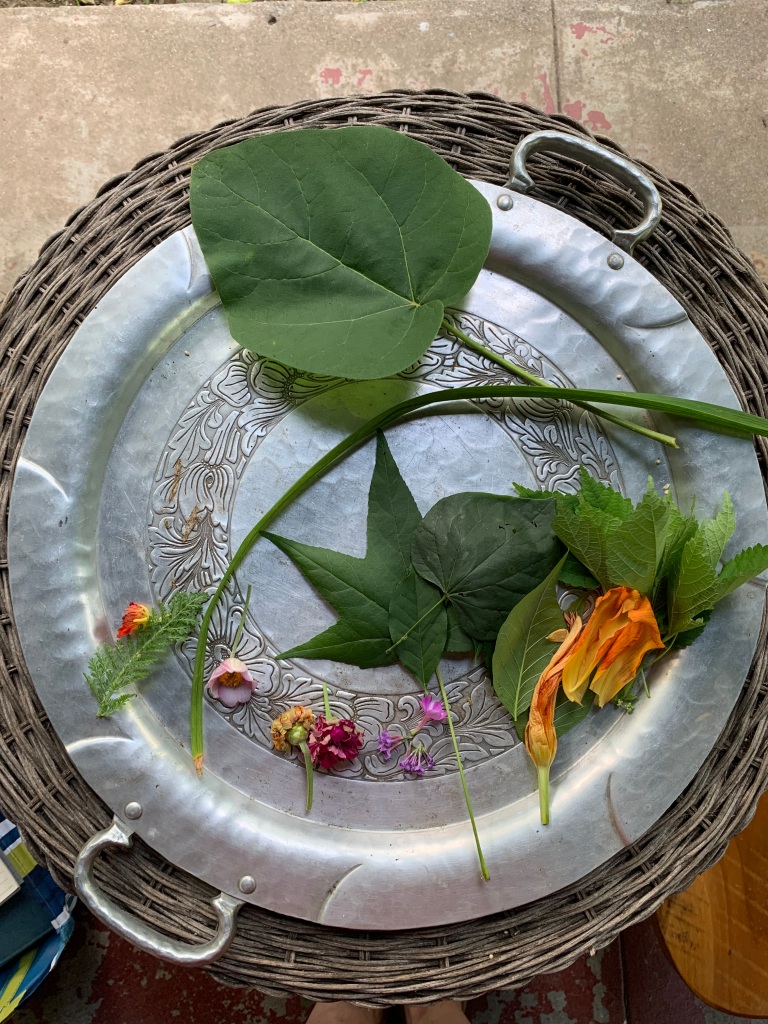
Tuesday September 22nd. Walking the dogs before dawn, I see my old friend Orion in the sky and I know that the season is turning. It’s the turning I hold in my mind as I drive my daughter to her job at sunrise. My city is about to explode. Today is the day that Kentucky’s Attorney General announces whether or not there will be charges filed against the police officers who killed Breonna Taylor. The downtown has been boarded up again, troops have been called in to surround federal buildings. Businesses have announced they are closed today. The courthouse is closed today. Everyone expects that it will be announced that there are no charges being filed. Everyone expects there to be a violent collective protest in response. The city holds its breath this morning. So much pain, anger, anxiety, fear everywhere we turn. On the drive with my daughter we are quiet for different reasons. She is still half asleep, facing her long day only a moment at a time. I am thinking about the sky, the changing light, what I wrote last night, what we are facing today. I know now what I am seeking when I put petal to paper, I know what it is that I love. It’s being part of the great circle for a moment, where creator and creation are one. The energy of the sun brought the flowers and trees into being. The art I make from them becomes part of the circle, my impulse to create makes me part of the circle too. The earth spins on its axis as it circles the sun in a solar system that travels as one of millions or more in a galaxy that circles with numberless others within the ever expanding mind of God. The act of drawing (drawing out what? Beauty? The essence of a moment?) helps me step out of human time, that loud clockwork affair, and into God’s time. That which remains when all the clocks are broken, when there are no verdicts to return. I am not powerless there. There, I am home.
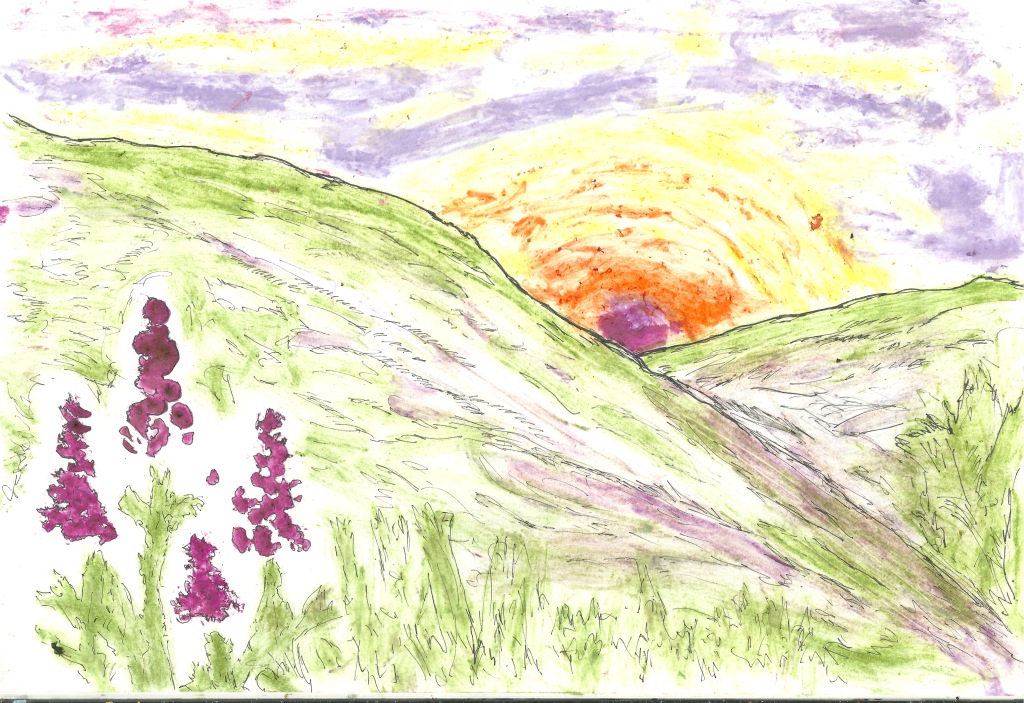
Filed under: Uncategorized, Writing | Tags: @lourdesgnavarro, @nprweekend, Climate Change, West Coast Fires

Sunday Morning September 13th 2020
I sit at the glass top table on the patio, a cup of coffee sweetened with honey and a tiny apple pie are my breakfast, one that was leftover from the batch I baked special for my daughter and her friends. The late summer insects sing with the birds, the air is full of petrichor from the night’s rain. It is greener than most Septembers that I have known. I listen to a radio interview with a woman who has been keeping an audio diary about helping her three children with their online schooling during the pandemic for NPR’s education segments, only this morning her family has had to evacuate from the fires raging near her small town in Oregon. They are all in a hotel with their two dogs outside of Redmond, Washington. Even there, you can see smoke in the air. The woman’s voice is calm and clear, all her strengths mustering in this moment to hold her family together. To keep them safe. To keep fear from knocking them flat. They will do their best to keep up with school online, she said. Her son was doing his online English assignment as they were packing the car to flee. She apologizes for not giving very specific answers to the questions about education, she laughs a little and says ‘it’s maybe not the first thing on my mind.’ I listen to her voice and understand that she is speaking from inside the hotel bathroom or the closet, while her family is in the room, perhaps sleeping, perhaps watching the news, texting their friends. What have you seen? How is our house? Is it close now? I look down at my little breakfast. The little pie I made with love sits before me. How can I allow myself its sweetness?

